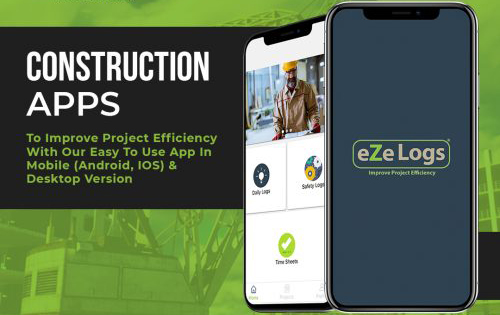The construction industry is rapidly developing, and cloud-based construction ERP (Enterprise Resource Planning) plays a crucial part in modern project management. Cloud-based construction ERP provides construction companies with a complete software solution to better manage projects, resources and finances more effectively.

Construction Management Software provides an all-in-one platform for overseeing all aspects of a construction project – budgeting and scheduling to procurement and tracking. Cloud-based construction ERPs help construction firms remain competitive by offering real-time data and analytics that allow for quick, informed decisions quickly and accurately.
Their ability to streamline processes, reduce costs, and foster collaboration has become essential tools in staying ahead of competition for construction firms looking for ways to stay competitive.
Benefits of Cloud-Based Construction ERP
Cloud-based construction ERP (Enterprise Resource Planning) systems offer numerous advantages to construction firms. Here are a few key benefits of adopting such an ERP system:
- Cloud-based construction ERP systems offer a centralized platform for managing all aspects of a construction project from budgeting and scheduling through resource allocation and document control, streamlining processes to increase efficiency for improved project performance.
- Cloud-based construction ERP systems allow teams to work in real-time regardless of location. This makes sharing information, tracking progress and making quick decisions easier and quicker than ever.
- Cloud-based construction ERP solutions tend to be more cost-effective than on-premise solutions, as they require less hardware and maintenance expenses while scaling easily as required.
- Cloud-based construction ERP systems offer enhanced security features such as encryption and two-factor authentication that help protect sensitive information while only authorized personnel gain access. This ensures only authorized parties access sensitive files on these cloud ERPs.
Cloud-based construction ERP systems provide numerous benefits that can help construction firms boost performance while cutting costs. If you’re in search of an easy, secure way to manage construction projects, using one may be just the solution for you.
Cloud-Based Construction ERP Solutions Present Difficulties for Implementation
Cloud-based Construction ERP can be an extremely useful way of managing the complexities associated with construction industry operations; however, its use poses certain difficulties and should be seen as part of an integrated strategy for success in managing this industry. However, using such technologies does present certain hurdles which should be kept in mind before adopting them as tools of success.
- Security: Cloud-based construction ERP systems store sensitive information that could be susceptible to cyber attacks; therefore it’s crucial that any sensitive data stored is encrypted before being uploaded onto the cloud server.
- Integration: Cloud-based Construction ERPs must integrate seamlessly with other systems, including accounting and project management software, making for an ongoing challenge of communicating between systems.
- Cost: It can be costly to implement and maintain cloud-based Construction ERP systems, and you should carefully consider both its own price tag and costs related to training and support when considering cloud systems as a potential choice for your organization.
- Scalability: For cloud-based construction ERP systems to operate properly, scaling must be possible at will and as workload demands change. However, this poses its own set of challenges; any extra strain must not overload or overwhelm the system.
Though cloud-based Construction ERP systems pose their own unique set of challenges, they can prove an invaluable aid for managing the complexity of this industry. With proper implementation and support from IT support specialists, these systems can streamline processes while increasing efficiency.
Choosing the Right Cloud-based Construction ERP System
Finding the appropriate cloud-based construction ERP system for your business may seem like a daunting challenge, with so many choices out there it can be hard to know which system would meet all of your requirements best. Here are a few key considerations when making this important choice:
- For your growing business, an ERP solution needs to accommodate more users, data and features as your needs expand. Consider selecting one with cloud functionality as you expand.
- Security should always be your top concern with cloud-based systems, so ensure the one you select has reliable safeguards in place to keep your information from falling into unwary hands.
- When searching for an electronic data management system, select one which integrates seamlessly with other software or systems you may already use, to ensure all of your information remains accessible from one central hub. This will make sure it stays current.
- When selecting a cloud-based construction ERP system, costs should always be a major consideration. Make sure to understand its total cost of ownership including any applicable fees or charges associated with it.
- Before selecting any system, ensure it offers an experienced support team who are on standby to address any concerns or answer queries you might have.
By carefully considering these key factors, you can ensure you find a cloud-based construction ERP system to suit the unique needs of your business and optimize performance and efficiency. With such a solution in place, your operations will become smoother while increasing efficiency.
Implementation Best Practices for Cloud-based Construction ERP
- Before undertaking to implement a cloud-based construction ERP, it’s crucial that a plan be in place containing goals and objectives of the project as well as timeline and resource requirements to complete it successfully.
- It is vitally important that an ERP be selected which fits with the unique needs of construction businesses in order to guarantee it can fulfill these essential tasks successfully. By making this important choice, one will ensure their system can meet every expectation posed by each business entity they manage.
- After choosing an ERP, it is vital that employees receive training on its use to ensure everyone can use it efficiently and effectively. This training should enable employees to utilise it efficiently without disruptions from users being lost during transition or confusion between systems.
- Before going live with any system, it is critical that it has been thoroughly tested to make sure it functions as intended and identify any potential problems before they become more significant. Doing this allows any potential issues with the system that might emerge to be identified early before becoming serious issues that require repair later.
- Once the system is live, it is vital that its performance be monitored carefully in order to identify areas for improvement and ensure the system runs optimally.
- Stay Current: To stay relevant in the construction industry, it’s crucial that one stays informed on current events and developments in order to keep pace with your changing business needs. Staying abreast with developments can ensure your system can keep pace.
Businesses can ensure their cloud-based construction ERP will meet all their business requirements by following these best practices for its successful implementation and usage.
Future Trends in Cloud-based Construction ERP
Cloud-based Construction ERP has quickly gained in popularity within the construction industry over recent years and looks likely to remain so for future years. Cloud ERP offers several benefits over traditional on-premise ERP systems such as cost savings, scalability and improved security compared to its counterpart.
Cloud-based Construction ERP solutions will continue to expand their power and feature set. Companies will gain access to more powerful analytics and reporting features that enable better decisions and operations improvements, and more user-friendly cloud ERP platforms which make the solutions accessible and usable by more people.

Cloud-based ERP market will become more competitive as more vendors develop solutions tailored to construction industry requirements, offering lower prices and increasing options to companies looking for cloud ERP implementation.
Finally, cloud-based ERP solutions will become increasingly integrated with other systems such as project management software and accounting applications, helping organizations streamline operations while increasing efficiency.
Overall, cloud-based Construction ERP is becoming an increasingly attractive choice among companies in the construction industry, and this trend should continue over the coming years. By offering more powerful features that improve user friendliness as well as increased integration capabilities with other systems – cloud ERP will become even more attractive to companies seeking to optimize operations.
The Bottom Line
Cloud-Based Construction ERP has an indisputable role to play in modern construction management, offering construction companies access to an expansive suite of tools and features designed to streamline operations, increase efficiency and cut costs.
Construction firms can access and share information quickly and safely using this secure data storage and collaboration platform, making access and sharing information much faster and simpler than before.
With cloud-based Construction ERP, construction companies can more efficiently oversee projects, track progress and ensure completion within budget and on schedule. In summation, cloud-based Construction ERP is an invaluable tool in modern construction management – essential to stay competitive in today’s market!


